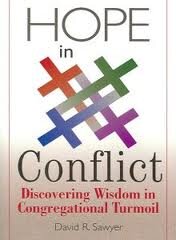David R. sawyer, Hope in Conflict: Discovering Wisdom in Congregational Turmoil. Pilgrim Press, 2007.
Referenced in:
LifeandLeadership.com Summary
The contribution of this volume is its refreshing hopefulness that church conflicts and crises can and often are redeemed into new life for congregations. This would be a good read for ministers who are discouraged by seemingly insurmountable and irreversible conditions, but who remain committed to see God work in his time to restore life and harmony to the church.
Sawyer draws from emotional systems, pastoral theology, and case studies to encourage beleagured church leaders to adopt a “sense of mystery” that looks beneath and beyond the uncertainties of church conflict and into the strategic, hopeful possibilities that often exist deep within difficult situations. This hopefulness stems from the spiritual reality that God’s work in conflict often exceeds human comprehension and control. Churches must posture themselves to work cooperatively with God and be used redemptively by him. In this respect, Sawyer prefers “conflict utilization” rather than the “conflict management,” which often suggests more human direction and control. While affirming the value of techniques, he says these often cloud the “the deeper, hidden, emotional interrelationships at work.”
Also, while Sawyer makes good use of emotional systems, he implies that systems theory is too strongly “horizontal” (i.e. focuses on human emotional processes). Instead, theology introduces a transcendant dimension wherein, “the congregation’s stories are often windows into the active movement of God in the congregation, and they indicate the openness to the future that God desires for them.” One may integrate systems to examine the congregation’s “structures, stories, and symptoms,” as well as its “interconnectedness” and “interrelatedness.” Believers must move a step beyond, however, to lean into the future resulting from God’s surprising work.
Sawyer provides a refreshing, balanced perspective for church conflict.
From the Publisher
This helpful guide shows pastors how to look beyond the superficial or most obvious reasons for a particular conflict within their own church, find what is hopeful in the conflict, and reframe the situation, giving the congregation the strength to change it as well.
About the Author
David R. Sawyer has spent most of his ministry near the Ohio and Mississippi Rivers. He came from near the confluence of those two rivers to Louisville to attend LPTS, was ordained in the Presbyterian Church (U.S.A.) in Southeastern Illinois Presbytery, did his advanced degree in organizational communication in the southeastern corner of Ohio, served churches in Cincinnati and Minneapolis, and worked on the presbytery staff in St. Louis. Returning to Louisville Seminary as teacher and administrator in 2002, he employed the great rivers watershed system as a metaphor for understanding the church as a human system, and for the responsibility of church leaders to tend the health and transformation of that system. Currently he and his wife, Dr. Deborah Fortel are writing a new book on the questions flourishing churches ask.
***For additional information on this resource, including reviews, click the bookstore links. Check the reference at page top or the links below for resource guides on related topics.***
See Resources on Over 100 Areas of Ministry Leadership:


